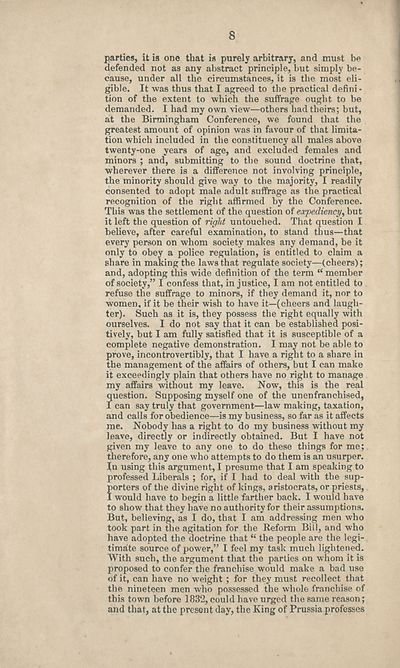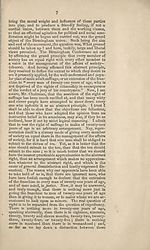Download files
Complete book:
Individual page:
Thumbnail gallery: Grid view | List view

8
parties, it is one that is purely arbitrary, and must be
defended not as any abstract principle, but simply be¬
cause, under all the circumstances, it is the most eli¬
gible. It was thus that I agreed to the practical defini¬
tion of the extent to which the suffrage ought to be
demanded. I had my own view—others had theirs; but,
at the Birmingham Conference, we found that the
greatest amount of opinion was in favour of that limita¬
tion which included in the constituency all males above
twenty-one years of age, and excluded females and
minors ; and, submitting to the sound doctrine that,
wherever there is a difference not involving principle,
the minority should give way to the majority, I readily
consented to adopt male adult suffrage as the practical
recognition of the right affirmed by the Conference.
This was the settlement of the question of expediency, but
it left the question of right untouched. That question I
believe, after careful examination, to stand thus—that
every person on whom society makes any demand, be it
only to obey a police regulation, is entitled to claim a
share in making the laws that regulate society—(cheers);
and, adopting this wide definition of the term “ member
of society,” I confess that, in justice, I am not entitled to
refuse the suffrage to minors, if they demand it, nor to
women, if it be their wish to have it—(cheers and laugh¬
ter). Such as it is, they possess the right equally with
ourselves. I do not say that it can be established posi¬
tively, but I am fully satisfied that it is susceptible of a
complete negative demonstration. I may not be able to
prove, incontrovertibly, that I have a right to a share in
the management of the affairs of others, but I can make
it exceedingly plain that others have no right to manage
my affairs without my leave. Now, this is the real
question. Supposing myself one of the unenfranchised,
I can say truly that government—law making, taxation,
and calls for obedience—is my business, so far as it affects
me. Nobody has a right to do my business without my
leave, directly or indirectly obtained. But I have not
given my leave to any one to do these things for me;
therefore, any one who attempts to do them is an usurper.
In using this argument, I presume that I am speaking to
professed Liberals ; for, if I had to deal with the sup¬
porters of the divine right of kings, aristocrats, or priests,
I would have to begin a little farther back. I would have
to show that they have no authority for their assumptions.
But, believing, as I do, that I am addressing men who
took part in the agitation for the Reform Bill, and who
have adopted the doctrine that “ the people are the legi¬
timate source of power,” I feel my task much lightened.
With such, the argument that the parties on whom it is
proposed to confer the franchise would make a bad use
of it, can have no weight; for they must recollect that
the nineteen men who possessed the whole franchise of
this town before 1832, could have urged the same reason;
and that, at the present day, the King of Prussia professes
parties, it is one that is purely arbitrary, and must be
defended not as any abstract principle, but simply be¬
cause, under all the circumstances, it is the most eli¬
gible. It was thus that I agreed to the practical defini¬
tion of the extent to which the suffrage ought to be
demanded. I had my own view—others had theirs; but,
at the Birmingham Conference, we found that the
greatest amount of opinion was in favour of that limita¬
tion which included in the constituency all males above
twenty-one years of age, and excluded females and
minors ; and, submitting to the sound doctrine that,
wherever there is a difference not involving principle,
the minority should give way to the majority, I readily
consented to adopt male adult suffrage as the practical
recognition of the right affirmed by the Conference.
This was the settlement of the question of expediency, but
it left the question of right untouched. That question I
believe, after careful examination, to stand thus—that
every person on whom society makes any demand, be it
only to obey a police regulation, is entitled to claim a
share in making the laws that regulate society—(cheers);
and, adopting this wide definition of the term “ member
of society,” I confess that, in justice, I am not entitled to
refuse the suffrage to minors, if they demand it, nor to
women, if it be their wish to have it—(cheers and laugh¬
ter). Such as it is, they possess the right equally with
ourselves. I do not say that it can be established posi¬
tively, but I am fully satisfied that it is susceptible of a
complete negative demonstration. I may not be able to
prove, incontrovertibly, that I have a right to a share in
the management of the affairs of others, but I can make
it exceedingly plain that others have no right to manage
my affairs without my leave. Now, this is the real
question. Supposing myself one of the unenfranchised,
I can say truly that government—law making, taxation,
and calls for obedience—is my business, so far as it affects
me. Nobody has a right to do my business without my
leave, directly or indirectly obtained. But I have not
given my leave to any one to do these things for me;
therefore, any one who attempts to do them is an usurper.
In using this argument, I presume that I am speaking to
professed Liberals ; for, if I had to deal with the sup¬
porters of the divine right of kings, aristocrats, or priests,
I would have to begin a little farther back. I would have
to show that they have no authority for their assumptions.
But, believing, as I do, that I am addressing men who
took part in the agitation for the Reform Bill, and who
have adopted the doctrine that “ the people are the legi¬
timate source of power,” I feel my task much lightened.
With such, the argument that the parties on whom it is
proposed to confer the franchise would make a bad use
of it, can have no weight; for they must recollect that
the nineteen men who possessed the whole franchise of
this town before 1832, could have urged the same reason;
and that, at the present day, the King of Prussia professes
Set display mode to:
![]() Universal Viewer |
Universal Viewer | ![]() Mirador |
Large image | Transcription
Mirador |
Large image | Transcription
| Antiquarian books of Scotland > Politics & government > Complete suffrage > (12) |
|---|
| Permanent URL | https://digital.nls.uk/125712271 |
|---|
| Description | Thousands of printed books from the Antiquarian Books of Scotland collection which dates from 1641 to the 1980s. The collection consists of 14,800 books which were published in Scotland or have a Scottish connection, e.g. through the author, printer or owner. Subjects covered include sport, education, diseases, adventure, occupations, Jacobites, politics and religion. Among the 29 languages represented are English, Gaelic, Italian, French, Russian and Swedish. |
|---|

